Local News
The Jewish National Fund is taking the federal government to court after its charitable status is revoked
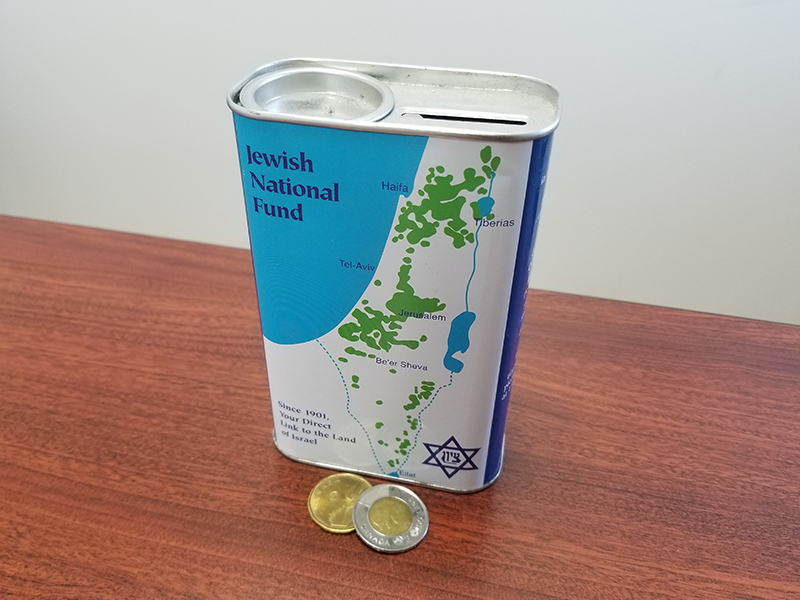
By JONATHAN ROTHMAN (Canadian Jewish News) The Jewish National Fund of Canada is taking the federal minister of national revenue to court over Canada Revenue Agency’s decision to revoke its status as a charitable organization.
The federal tax agency’s review of JNF’s funding activities followed reports that it was funding projects in Israel related to the military, which would violate Canada’s rules for charitable organizations.
JNF’s court filing says it will contest CRA’s “wrong and unjustified decision to revoke our charitable status,” according to a letter from JNF’s board president Nathan Disenhouse and CEO Lance Davis posted online July 25.
The organization says that while the matter is before the courts, JNF’s charitable work will continue, “including collecting donations and issuing charitable receipts.”
The CJN made multiple requests for an interview to JNF, including to Davis specifically. While JNF did not grant an interview, the organization provided an emailed response to The CJN’s questions about the matter.
“The CRA has only signaled its intention to revoke, and its policy is to revoke only after the charity’s avenues of appeal are exhausted. So, it is the status quo until there is a court ruling. In the interim, we remain open to working with the CRA on alternate courses of action,” JNF told The CJN.
In its federal court appeal notice, JNF also posits there is a “reasonable apprehension of bias in the decision,” saying Canada’s revenue minister “was under great public pressure to revoke [JNF’s] registered charity status.”
JNF maintains the core issue for the revocation remains “the CRA’s assertion that our original founding charitable object that it accepted almost 60 years ago is now no longer considered to be a charitable object.”
Media reports about JNF’s struggles with the CRA since the July 24 court filing have inaccurately referenced past projects, conflating two different matters, Disenhouse and Davis wrote in an email to Canadian supporters on July 30. JNF sought to “clear up a misconception” it said had been “advanced in numerous articles recently published about JNF Canada,” they wrote in the July 30 email.
“The articles conflated the matter of JNF’s community projects on IDF bases and our recent notice of confirmation to revoke our charitable status. In the June 26, 2024 correspondence from CRA, there was not one mention of the projects on IDF property.”
Some of the previous projects, critics of JNF alleged over the past decade or so, had taken place on land that crossed into the West Bank, or involved infrastructure supporting the military, like building playgrounds on a military base. (One of its fiercest critics, Independent Jewish Voices (IJV), a Canadian Jewish group which supports the boycott and sanctions movement against Israel, has been involved for more than a decade in the attempt to have CRA revoke JNF’s charitable status.)
“The fundamental issue was with respect to our charitable purpose. It was very unfortunate that certain journalists shared content from articles about JNF Canada from many years ago that was not referenced in CRA’s recent correspondence,” Disenhouse and Davis wrote to supporters.
In the late 1960s, the minister of national revenue approved the organization’s purposes and activities, and so “we did not know that there was an issue with our purposes or activities because previous CRA audits did not reveal an issue,” JNF wrote to The CJN in a response to emailed questions.
The organization has been audited five times by the CRA since it began in the 1960s, with the most recent audit in 2014. As a result of that audit, which was based on work done in 2011 and 2012, JNF learned in 2019 that the CRA intended to revoke its charitable status.
JNF said that since the original notice of intent to revoke was issued in 2019, the CRA has been unwilling to meet in person with them.
JNF points out that, according to CRA’s website, they revoked three to five percent of charities audited, “and a large number of them are for failing to file their annual documentation with the CRA. It is evident, based on the statistics, that it is only in rare occurrences is a charity revoked.”
JNF’s email went on to explain that CRA had refused to pursue options other than revocation of its charitable status.
“There are a number of options available to the CRA aside from revocation and we do not understand why they would pursue the most punitive course of action,” JNF wrote.
JNF said CRA had not taken the steps that are outlined on its website, including “exploring compliance measures such as education letters, compliance agreements and sanctions before revoking an organization’s charitable status.”
“The CRA not only skipped steps one to three, it also refused to entertain our suggestions of new objects for our charity or to discuss a compliance agreement,” wrote JNF in the email, adding that CRA representatives “refused to sit down with us at any point in the 10 years of this audit, except for one meeting a few months ago when two representatives of the appeals division granted us an hour and arrived at the meeting with no agenda and no questions for us.”
Bias in the audit, JNF claims
JNF said its appeal filing argues that “there is a reasonable apprehension of bias in the audit.”
An access to information request made it evident “that there was a campaign of anti-Israel organizations, unions, political parties, etc. calling upon the CRA to revoke JNF’s charitable status.
“We have written to the CRA with our concerns that this content may have biased the audit process. CRA replied in writing that there was no bias in the audit.
“This evidence of bias comes from the CRA’s own records, which show that the public pressure on the CRA and the minister to revoke JNF’s status was an important consideration within the chain of authority at the Charities Directorate,” the charity told The CJN.
JNF clarified its position regarding potential CRA bias.
“To be clear, we are not suggesting the CRA is antisemitic,” JNF wrote.
“As a Zionist-inspired organization, however, JNF Canada has many vociferous antisemitic detractors who we believe have influenced the decision-making process in this matter. “
The work done by JNF
Established in 1967, JNF, one of Canada’s oldest Jewish charities, is known for its tree-planting and environmental work in Israel, along with building playgrounds for children. Its more recent projects include JNF Quebec division’s Climate Solutions Prize, which encourages the development of innovative technology addressing climate change by nonprofit institutions and early-stage companies.
However, some of JNF’s projects, which its critics allege support the Israeli military or are on land in the West Bank, have made it the focus of scrutiny by Canadian critics of Israel. Adding to that scrutiny, former prime minister Stephen Harper—criticized by some for his pro-Israel stance–was a visible JNF supporter during his years in office, and JNF named the visitor centre at its Hula Valley bird sanctuary in Israel which opened in 2006 for Harper,
In its email to The CJN, the charity says that it has “systematically and comprehensively addressed” the issues raised in CRA’s 2014 audit.
“Although we do not concede that building parks and playgrounds on IDF land is a violation of charity law, we are no longer are involved with projects on IDF land or any projects that may in any roundabout way benefit the IDF.
“While JNF Canada disagrees that it is contrary to Canadian foreign policy to develop projects on disputed territory (there are dozens of Canadian charities that operate in the disputed territories with CRA’s blessing), we have not supported new projects in the disputed territories since this matter was brought to our attention.”
JNF said that it has an Israeli lawyer review issues of land ownership before undertaking a project “so that we can be certain that we are not doing anything in violation of CRA policies,” and that it had hired a new chief financial officer “who has worked closely with our legal counsel to enhance our record keeping.”
On its website, JNF says its mission currently is “focusing our efforts on the greatest needs in social and environmental infrastructure.”
“We will continue to raise funds in support of building Israel’s charitable social infrastructure to the benefit of vulnerable populations such as youth-at-risk, victims of domestic abuse, children with special needs, veterans and the disadvantaged” while the court appeal proceeds, JNF wrote.
“JNF Canada’s projects benefit all residents of Israel regardless of their religion, ethnicity, creed, [or] orientation.”
Years of anti-Zionist activism led to this moment
The current legal challenge follows years of scrutiny from opponents of the organization, including but not limited to IJV.
IJV’s national coordinator, Corey Balsam, who trumpeted the victory on social media, said the decision came after years of the group’s work on this file, though he noted JNF’s court appeal notice.
“Can’t believe it happened! IJV started working on this 15 years ago, building on decades of work by Ismail Zayid and others,” posted Balsam, referring to one of the four individuals IJV had helped to organize the campaign to have JNF’s charitable status probed and removed over JNF’s Canada Park project.
In 2017, IJV filed a complaint against JNF with federal authorities, alleging that the charity’s activities contravened the Income Tax Act, international law and CRA guidelines.
Then, in a highly critical CBC News article in January 2019, reporter Evan Dyer wrote that JNF had been the subject of the CRA audit over a complaint that it used charitable donations to build infrastructure for the Israel Defense Forces “in violation of Canada’s tax rules.” (JNF maintains that its last CRA audit was in 2014, though conflicting reports reference an audit in 2018. The notice of intent to revoke JNF’s status by CRA is dated August 20, 2019.)
JNF pushed back on the allegations that JNF Canada and its Israeli parent organization, Keren Kayemeth LeIsrael (KKL-JNF), were supporting projects at several military bases, including outdoor fitness areas, developing a new training base, upgrading an existing auditorium for solider intake and new mess hall facilities at two air force bases.
JNF Canada says it stopped funding those projects in 2016 following CRA guidance and told Dyer for that report that JNF operates within CRA rules concerning the organization’s charitable status.
JNF’s CEO, Lance Davis, said at the time the projects were carried out on land owned by the IDF, but that JNF Canada’s charitable funds never flowed to the IDF.
Davis told The CJN in 2019 that with regards to projects “in disputed territory,” JNF is committed to continuing to work with the CRA “to ensure we are in full compliance,” and referred to a 2015 opinion piece in The CJN written by Alan Baker, Israel’s former ambassador to Canada, which argued that the land on which Canada Park sits was “never part of any Palestinian state or entity.”
In 2021, JNF Canada announced it had distanced itself from KKL-JNF which is “an Israeli public benefit corporation.”
“KKL serves as an agent to JNF Canada on a number of our charitable projects. This means that KKL works for JNF Canada in realizing projects that our board selects and agrees to fund. There is a long history between our organizations and we proudly collaborate with KKL on a variety of projects that advance Zionist education and enhancing the environment as well as the quality of life for the people of Israel,” JNF wrote in its email to The CJN.
“There was confusion with respect to the relationship between the two organizations so we rebranded to clarify that we are an independent Canadian charity.”
What the CRA has to say
A spokesperson for CRA declined The CJN’s request for an in-person interview, instead offering written responses to questions.
Addressing JNF’s allegations of anti-Israel sentiment within the CRA’s ranks influencing the charitable status revocation decision, CRA spokesperson Nina Ioussoupova told The CJN via email that the agency is “committed to administering acts for which it is responsible in a fair and impartial manner.”
“The CRA assesses all concerns about registered charities against a clear regulatory and risk framework designed to prevent bias in our decision-making process,” she wrote.
“Additionally, the CRA has a responsibility to protect the integrity of the tax system and the charitable sector and fulfills this responsibility through a balanced program of education, client service, and responsible enforcement, including audits.”
Citing confidentiality provisions under the laws it administers, CRA declined to comment on specific details of court cases.
The website Charity Intelligence Canada currently lists JNF Canada at a one-star rated charity. “JNF Canada is not financially transparent. Its audited financial statements are not posted on its website nor provided when requested,” the website reported.
Its last audited financial statements in 2022, show that JNF received $13.2 million in donations and spent $6.2 million on programs and grants, according to the Charity Intelligence page. JNF Canada’s reserve funds are $30.8 million, the website reports.
“JNF Canada works in Israel and Canada. Its programs in Israel focus on funding social and environmental infrastructure, while its Canadian projects focus on outreach and education in Jewish communities,” the Charity Intelligence page reads.
The website lists the charity’s five core programs as Builders Circle, Climate Solutions Prize, JNF Education, JNF Families, and JNF Future, but notes that JNF “does not provide a breakdown of spending by program.”
As of July 26, Charity Intelligence Canada has updated its JNF page with the following information:
“After nearly [five] years of review and exchanges with JNF Canada, the CRA Charities Directorate announced its decision to revoke its charity status. This would mean that support for JNF Canada no longer receives donation tax receipts. JNF Canada is appealing this decision claiming that the CRA Charities Directorate’s decision is wrong and unjustified.”
Local News
New Israeli restaurant opens in River Heights

By BERNIE BELLAN (July 6, 2025) It’s been a long time since our community has been able to welcome the opening of a restaurant that specializes in Israeli food.
That void is now going to be filled with the opening of The Green Falafel, at 1833 Grant (corner of Centennial – next to the Subway).
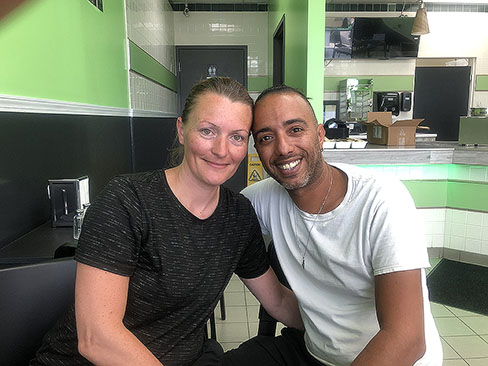
The restaurant is the fulfillment of a dream long held by the husband and wife team of Ariel and Eden Maudi, who have been living in Winnipeg the past 11 years.
Ariel, who was born in Israel and grew up in Beer Sheva, says that he worked in telecommunications in Ramat Gan for several years. He adds though that he had always dreamed of owning his own falafel stand in Israel, but life was difficult there and he decided to come to Canada as a tourist to see whether there were any opportunities here for him, Eden and their two young children.
Eden, who was born in Russia and moved to Israel with her family in 1996, stayed behind with the two kids, who were both pre-schoolers, while Ariel tested the waters in Canada first.
Ariel says he came to Canada as a tourist in 2013. His first stop was in Toronto, where he acquired his 1st class driver’s license. At the end of 2013 he moved to Winnipeg where he began working as a truck driver. Soon he found himself employed as a successful sales person at Vickar Nissan where, he says, he once achieved the status as the top car sales person in Canada. After working at Vickar Nissan for a number of years, Ariel began working as an installer for Bell MTS.
Meanwhile, Eden began working at a Walmart, later at the Costco on Regent.
But, when the opportunity to move into a space that had been previously occupied by another restaurant, but which had closed, became available, Ariel and Eden decided to open their own Israeli restaurant in an area that hadn’t seen Israeli food served since the controversial closure of Bermax Café in 2019.
The Maudis say that they will be serving a variety of Israeli dishes – all vegetarian, and that they will be fully kosher.
The “green” in Green Falafel, by the way, Ariel Maudi explains, comes from the cilantro and parsley that are added to the chickpeas. In addition, their pitas will be coming from Israel and will be baked fresh daily.
The Green Falafel will be open from 10-8 daily. Delivery will be available through Uber Eats and DoorDash.
Call 204-557-7837 for information.
Local News
Previews of shows with Jewish performers at this year’s Fringe Festival July 16-27

For show dates and venues go to winnipegfringe.com
By BERNIE BELLAN As has been our custom for many years now we try to find shows that have either Jewish performers or themes that would have particular appeal for Jewish audiences. Many of the Jewish performers at this year’s festival have been here before, but several are new. In no particular order here are blurbs about the shows we’ve found that fit the criteria I’ve just described. (By they way, if we’ve omitted a show that should be included in our list there’s plenty of time to get added to this post. Just drop me a line at jewishp@mymts.net.)

You’ve Been Served: A One-Woman Show About Divorce, Cults, and Coming of Age at Midlife
Noemi Zeigler
You are hereby summoned… to laugh, cry, and maybe belt out a Streisand number in solidarity. You’ve Been Served is a raw and riotous solo comedy by writer-performer Noemi Zeigler. It all begins when Noemi is served divorce papers on top of a garbage bin lid while taking out the trash—an undignified start to a full-blown midlife unraveling.
At 50, still clinging to her dream of becoming a singer, she falls under the spell of a music producer slash self-help guru, joins a spiritual cult, and, instead of landing a record deal, she lands in jail. Behind bars, with help from her long-buried inner child, she begins to reclaim her voice and her power. Turns out, dreams really do come true—just not the way she expected.
The show features vividly drawn characters—including a manipulative cult leader, a toxic ex-husband, and a jail guard named Roach who shares Noemi’s obsession with the fashion of Charlie’s Angels (the ‘70s TV version, of course.)
With salsa dancing, twerking, and a belting rendition of Don’t Rain on My Parade, Zeigler dives into abandonment, reinvention, and self-rescue. As she confronts perimenopause, she discovers it’s not the end—it’s the new puberty. The show touches on grief, sexuality, and spiritual confusion, but Noemi’s childlike optimism asks: What if your breakdown is actually your breakthrough?
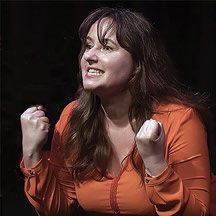
You’re good for nothing… I’ll milk the cow myself
Written & Performed by Natacha Ruck
France, 1981: The first socialist president is about to be elected and young Natacha is ready to implement her own political platform. But first, she has to take down the schoolyard bully,emasculate the rules of French grammar and make off with grandmother’s chocolate.
If you think you know the limits of Jewish mothers, evil grandmothers and transcontinental lovers, meet Natacha Ruck’s family. This true tale of three generations of women, facing three world wars, is equal parts hilarious, shocking and zany.

A One Human Being, Potentially Comedic Performance of Beauty and the Beast NEW WORK!
Written & Performed by Alli Perlov
Be our guest! Local high school drama teacher Alli Perlov is back for a tale as old as time. Can she sing? Not really. Can she act? That’s debatable. Will you laugh? Oh… probably.
Perlov plays dozens of characters, some human, some animal, and many objects, in a comedic exploration of Beauty and the Beast.
In an homage to this brilliant musical adventure, through witty commentary and unstoppable energy, Perlov aims to entertain an audience that isn’t forced to be there like her students.

Hockey Sticks and Beaver Pie
Written & Performed by Melanie Gall
Take a trip around Manitoba. From the 30,000 ft. St. Adolphe snow maze to the Narcisse snake dens! After all, where else holds both the title of Slurpee Capital of the World and the Guinness Record for the most people simultaneously howling like wolves?
Deanna Durbin, Terry Jacks and Burton Cummings are among the many homegrown stars, and Hockey Sticks features their music along with original songs and the stories that make this province unique.
Starring Melanie Gall from past shows Piaf & Brel, Ingenue and Toast to Prohibition
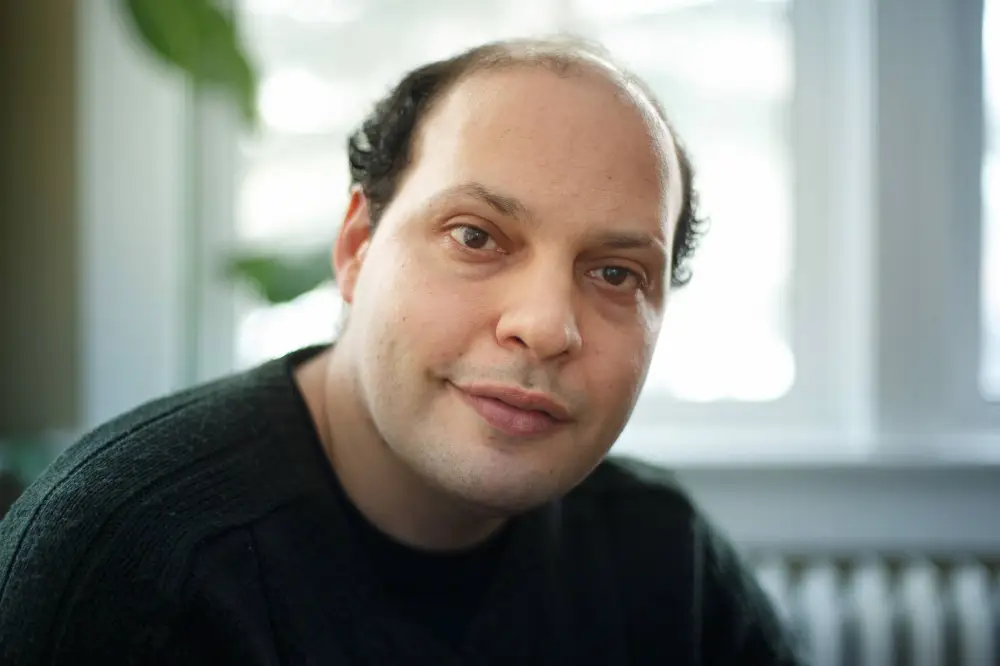
Nerohilarity Exposed
Produced by Adam Schwartz
We all sometimes feel exposed, whether that’s as a fraud or a pretender.
The performers of the award-winning Neurohilarity show, Danielle Kayahara (Laugh Out Loud CBC), Carole Cunningham (Yuk Yuks, The Debaters), Adam Schwartz (Winnipeg Fringe) and Rollin Penner (Yuk Yuks, CBC, Rumors, Winnipeg Comedy Festival), apply a comedic spin to the experiences that make us feel insecure, stripping away the emotional weight with nittygritty jokes and stories that will have you laughing uproariously.
Brilliantly awkward.

A Lesbian in the Kitchen
Willow Rosenberg
Professional lesbian Willow Rosenberg takes you on a journey through the centuries, superstitions and tablespoons of her lifelong passion for baking in this spiritual successor to 2024’s Jenny Award-nominated A Lesbian in a Bear Store.
Whether you have a favourite spatula, bake once or twice a year, or live in constant fear of being told to “just fold it in”, this one-woman show about family, joy, tradition (but make it gay),
Judaism, comfort, home (but make it gayer*), love, chemistry and magic is for you!
*Who’re we kidding, it’s all gay!

Eleanor’s Story: An American Girl in Hitler’s Germany
Written & Performed by Ingrid Garner
(Ed. note: Although Ingrid Garner isn’t Jewish, we thought the theme of this show might have a special appeal for Jewish readers.)
Based on Eleanor Ramrath Garner’s best-selling memoir, this 16x internationally award-winning adaptation – performed by her granddaughter, Ingrid Garner – details Eleanor’s youth as an American caught in Second World War Berlin.
Punctuated with humour and accompanied by cinematic sound and video, Garner embodies her ancestors in this coming-of-age odyssey, delivering an account of war that is more relevant than ever.
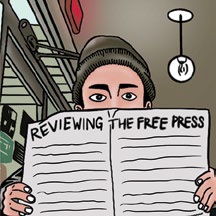
Reviewing The Free Press 2
Benji Rothman
The Winnipeg Free Press has run amok, reviewing each and every Fringe show over the past two decades without consequence or recourse. Now, it’s their turn… again.
In this refurbished work that debuted at last year’s Winnipeg Fringe, Benji Rothman once again takes the Winnipeg Free Press to task. In this (mostly) new, (hopefully) hilarious 45-minute show, Rothman dives deep into their past and exposes their faulty journalism, imbalanced reporting and, of course, embarrassing typos.
Local News
Jewish performers at this year’s Winnipeg Folk Festival July 10-13

The Black Sea Station
Long ago, there were the klezmorim, itinerant musicians who roamed the back streets of Eastern Europe, playing at parties for meals and a few coins. The sound they honed then was a visceral exploration of life’s joy, and its loss; they could whip audiences into a frenzy of dancing, or bring them to tears with the mournful wail of a clarinet. Today, Winnipeg’s own The Black Sea Station is carrying on this tradition. Featuring Daniel Koulack (bass), Victor Schultz (violin) and Myron Schultz (clarinet) — cofounders of seminal local klezmer act Finjan — along with Moldovan accordion wizard Nikolai Prisacar and multi-instrumentalist Ben Mink, the quintet transports listeners to a time and place long past. Through a mix of original songs rooted in history, and traditional tunes spun up with modern zest, they whirl through the exuberant klezmer sounds of their Eastern European heritage, tending the old ways with deep love and respect.
The Black Sea Station will be performing Sunday, July 13, at 1:00 pm in Snowberry Field.
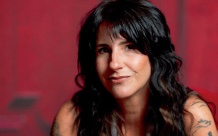
Romi Mayes
Romi Mayes has taken some hard knocks in her life, but she’s never faded away. For more than 25 years, Manitoba’s first lady of blues-rock has been a lynchpin of the Canadian roots scene. She earned that position the old-fashioned way, through her gritty, passionately emotive music. With her sizzling guitars and full-throated rasp, the Juno-nominated performer howls and purrs through razor-edged lyrics, rocking out wherever she can find a stage. She’s long been one of the hardest-working musicians on the circuit, keeping a busy slate of gigs and mentoring up-and-coming artists to get a foothold on the trails she blazed. Now, after a nine-year hiatus from the studio, Mayes has put her scintillating sound back on record with her long-awaited seventh album, Small Victories — a return that leaves no doubt, no matter the ups and downs, Mayes is here to stay.
Romi will be performing Friday, July 11, at 1:00 pm in Burr Oak.

Leonard Podolak (with Matt Gordon)
Ireland’s Matt Gordon is a fiddler and singer, whose fleet-footed clogging and thigh-slapping hambone has taken stages by storm since the 1980s. Leonard Podolak is a virtuosic master of the clawhammer banjo, who for decades has whipped up some of Manitoba’s wildest roots parties with his band, The Duhks. Put those talents together, and they can promise you this much: we’re all gonna have a real good time. Longtime friends and musical collaborators, Gordon and Podolak deliver an exhilarating trip through old-time Appalachian music. Their performances seamlessly blend intricate instrumental lines with heartfelt singing and dazzling dance. They’ve teamed up on a few records over the years, including 2020’s bigband extravaganza Power Wagon: Live At Shanley’s. But the best way to experience this duo’s toe-tapping, hand-clapping chemistry is to see it live.
Podolak and Gordon will be performing A concert with a side of clogging Sunday, July 13, at 3:00 pm in Folk School.




